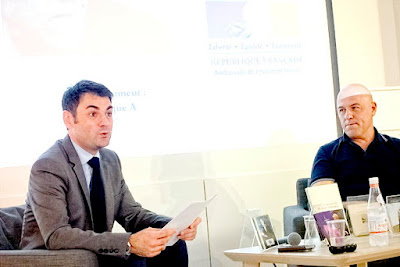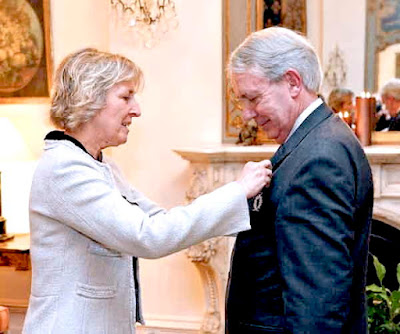The Director welcomed everybody to the event, including those sitting in the reserved seats in the first two rows. It seems like this was a big occasion.
Dominique A, singer, composer and author, is clearly big on the scene at home in France.
I had met Loïc once before when, funny enough he was interviewing a French author Philippe Djian who had just written a dirty book which was in for some prize or other.
Tonight he was interviewing Dominique whom AMOPA (see below) had invited over specifically for this occasion.
Just like the last time I noticed that at least one other event was slipped into the trip.
Loïc has just finished a term as President of the newly formed AMOPA and is now the Honorary Consul for France in Ireland's mid-west.
He introduced Dominique, listing some of his many achievements, and then got down to business as in the first shot above.
Dominique did the interview seated as in the first shot above, but given the lighting problems for photos (see below) I'm using some post-interview shots here.
My own impression, from the few tracks played, was of something in the style of Leonard Cohen with perhaps a bit more melody and a trademark of stopping mid-phrase.
Dominique is a flag bearer for a particular style of song for almost a generation at this stage. I gather he experiments with form but we only heard a few tracks in broadly similar style.
The idea seems to have been to veer away from what were seen as "talkies" (chansons à texte) with the likes of Brel and Brassens and go for more melody. The nuances here, I must confess, are a bit beyond me. It would probably take a lavishly illustrated talk on its own to get to the bottom of this.
What I could appreciate is that Dominique has a lovely voice and he sings true.
Dominique is clearly accepted as an exponent of French culture abroad. In 2007 the Alliance invited him to perform in Argentina and here he is tonight.
In fact, only a short while ago in 2016, he was made a Chevalier de l'Ordre des Arts et des Lettres.
Despite this not being quite at the top of the heap of French honours and even though Chevalier is the lowest of the three grades of the award, you can see below that it has gone to some heavy hitters. And they're just the ones whose names I recognised.
L’ordre des Arts et des Lettres est une décoration honorifique française qui, gérée par le ministère de la Culture, récompense « les personnes qui se sont distinguées par leur création dans le domaine artistique ou littéraire ou par la contribution qu'elles ont apportée au rayonnement des arts et des lettres en France et dans le monde.
| Jane Birkin Dirk Bogarde Carla Bruni Sarkozy Tim Burton Jim Carrey Jackie Chan | Jacques Chirac George Clooney J. M. Coetzee Céline Dion Declan Donnellan René Goscinny (Astérix) | Jean-Claude Juncker Jude Law Kylie Minogue Jean Quatremer Sting Uma Thurman |
Jean Quatremer is an interesting entry on the list. I'm not sure why he's still there as he has returned his honour. It was awarded without notice or consent (went to the wrong address) and he did not think it appropriate for an independent journalist to accept honours from a governement. I gather he may reconsider the matter when he retires. Perhaps that's why he's still on the list (pending!).
He is the journalist who recently exposed the Selmayrgate scandal at the heart of the EU Commission.
Quatremer has figured prominently in my Twitter timeline
AMOPA
AMOPA is an association of those who have been awarded the Ordre des Palmes Académiques by the French government. It's a sort of knighthood awarded for a significant contribution to French language and culture.
The Association in its own words:
L’AMOPA Irlande est la section irlandaise de l’Association des Membres de l’Ordre des Palmes Académiques, association française reconnue d’utilité publique. L’une des principales missions de l’AMOPA Irlande, association caritative, est d’organiser ou de soutenir des projets éducatifs ou culturels à destination de la jeunesse afin de promouvoir la langue et la culture françaises en République d’Irlande.
My cousin Michael is a recipient but I don't think he has yet paid his subscription to the Association.
My Légion d'Honneur
I am still waiting for my Légion d'Honneur for my work in the establishment of the European Bank for Reconstruction and Development, La BERD. Michael Somers has got his but his support staff have been forgotten.
I wondered though might I qualify for one of the palmy ones. They are, after all, two rungs down from the Légion d'Honneur and a Chévalier there is a whole nine steps down from the top if you count the internal ranks.
So I decided to try and make a list in support of my sterling contribution to French literature and culture over the years. It turned out not to be all that convincing.
I have supported French tourism by issuing day passes to tourists from Jersey CI to St. Malo.
I don't have a general in the family but I have given one-to-one tutoring to four grandsons of a French general.
I took two orals in French rather than English in the College of Europe to spare the egos of two francophones.
I brought a busload of students from Bruges to Lille in 1968 to the Assises Nationales of the Gaullist party.
I translated French documents for work when we had just joined the EEC and the Commission's translation unit wasn't yet up to speed with English. [Unfortunately this appears to be the wrong way round for the present purpose.]
I have written three original songs in French on de Gaulle, the EEC and the Civil Service, none of which have yet been performed before the general public.
I have also suffered the outrageous slings and arrows of former President Mitterand's long time economic advisor and éminence grise, Jacques Attali. Died for my country there I did.
I came to the posthumous defence of my first French teacher when he was traduced in a TV documentary by two Irish journalists. [Don't think that will help though as he was Flemish and opposed the frenchification of his native Flanders.]
I have given a talk in French in the Alliance, in the bicentenary year of Waterloo, on the Defence of Killiney Bay in the Eighteenth and Nineteenth centuries, with paticular reference to the Martello Towers. [Oops, the Martellos were to shoot at the French rather than at their enemies.]
I have had a cartoon of myself done in the Place du Tertre in Paris and also in the Alliance.
I have pointed out to the French Embassy (twice) that they were flying the European flag upside down. [Don't suppose that will endear me to them though.]
SOME SUGGESTIONS
I have attended a number of events in the Alliance in recent years. The most striking change over that period is the switch from La Cocotte to the new Médiathèque. The café was awkward. People had to be thrown out coming up to tea time to facilitate preparations for an event. There was some noisy machinery at what became the bottom of the room - fridges I think.
The Médiathèque is a bespoke environment and, as it houses the library, it is always quiet.
I had not noticed at previous functions, but there were a few drawback's to Dominique's event. I think what brought one of them out was the double focus on both the participants in the interview and the screen behind. The screen called for dim room lighting while the interview called for the reverse to be able to see, and photograph, the participants. Everyone, including the Alliance itself, is taking photos at these event for spreading on social media, and it would be in the Alliance's interest to facilitate this. I imagine installing a few spots to illuminate the podium without obscuring the screen should do the trick.
That's the lighting. On sound it would be better to wire up the participants so that a sound check at the beginning could achieve the best in clarity. It would also mean that the participants would not have to constantly worry about how they held the mics. The clarity would be more important to me than to many others. I struggled to follow the French on the night.
Given that the only microphones were those of the participants, questions could only be accepted from the first two rows if the rest of the audience were to be able to hear them. A roving radio mic would improve matters enormously.
Just some thoughts for another occasion.








No comments:
Post a Comment
Bona fide comments only. Spamming, Trolling, or commercial advertising will not be accepted.